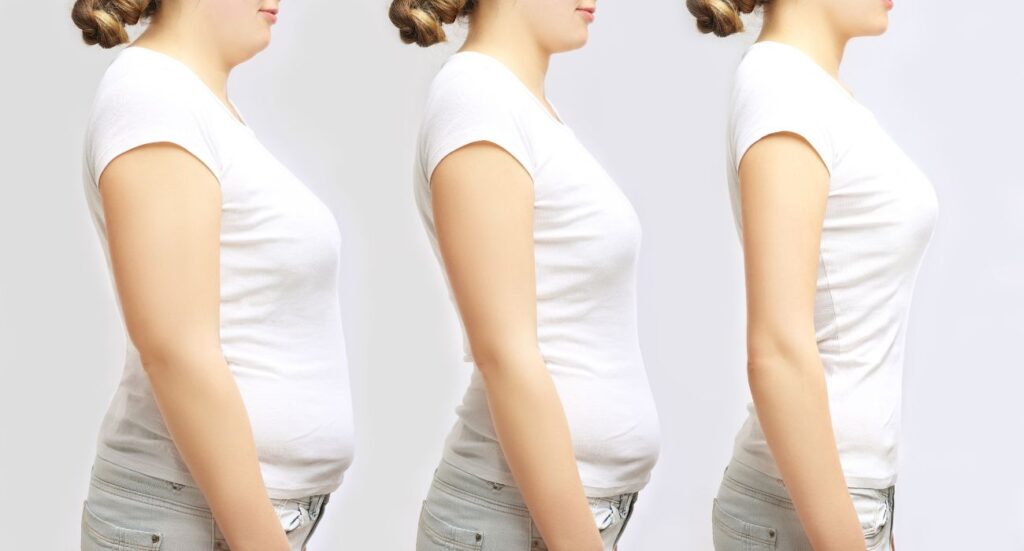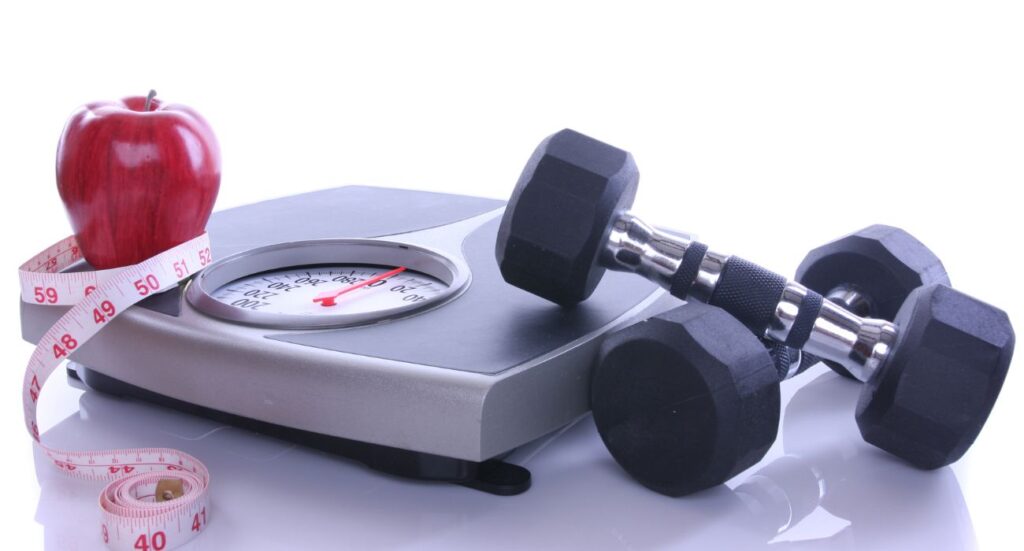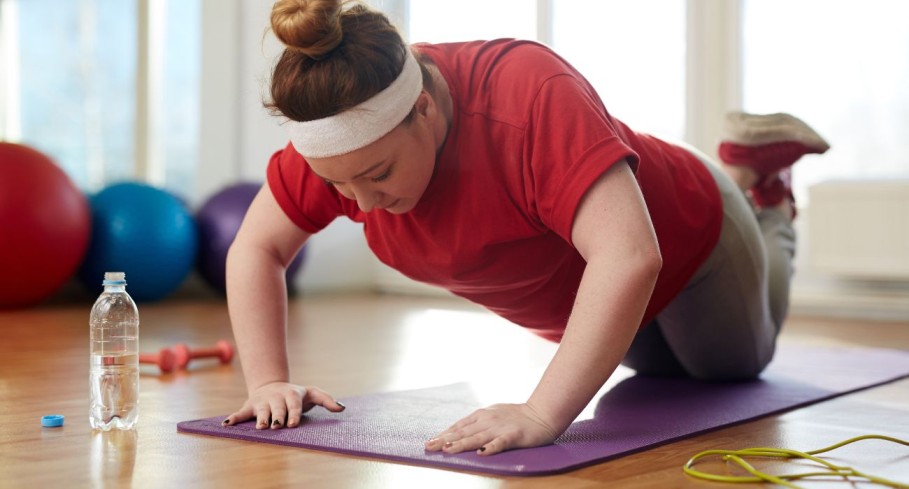
Losing weight can be a challenging and frustrating journey, especially when you want to see results quickly. The internet is flooded with countless fad diets, exercise plans, and weight loss supplements promising fast and easy results, but most of these strategies are not sustainable or healthy in the long run. So what is the best way to lose weight fast? In this article, we will explore evidence-based strategies that can help you achieve your weight loss goals quickly and safely.
Understand the basics of weight loss
Before we dive into specific strategies, it’s important to understand the basics of weight loss. The key to losing weight is creating a calorie deficit, which means burning more calories than you consume. One pound of body weight equals roughly 3,500 calories, so to lose one pound per week, you need to create a calorie deficit of 500 calories per day. This can be achieved through a combination of diet and exercise.
- Cut back on calories
One of the most effective ways to create a calorie deficit is by reducing your daily calorie intake. However, it’s important to do this in a healthy and sustainable way, as drastically cutting calories can lead to muscle loss, nutrient deficiencies, and a slower metabolism.
To reduce your calorie intake, start by tracking your daily food intake using an app or journal. This will help you become more aware of what you’re eating and identify areas where you can make healthier choices. Focus on filling your plate with whole, nutrient-dense foods such as fruits, vegetables, lean protein, and whole grains. These foods are low in calories but high in fiber and protein, which can help keep you full and satisfied.
You can also reduce your calorie intake by cutting back on sugary and high-fat foods such as candy, pastries, fried foods, and processed snacks. These foods are high in calories and low in nutrients, so they can easily derail your weight loss efforts.
- Increase physical activity
In addition to reducing your calorie intake, increasing your physical activity can help you burn more calories and create a larger calorie deficit. Aim for at least 30 minutes of moderate-intensity exercise, such as brisk walking or cycling, most days of the week.
You can also incorporate strength training exercises, such as weightlifting or bodyweight exercises, to build muscle and increase your metabolism. Muscle tissue burns more calories than fat tissue, so the more muscle you have, the more calories you’ll burn at rest.
- Practice intermittent fasting
Intermittent fasting has gained popularity in recent years as a weight loss strategy. It involves alternating periods of eating with periods of fasting, such as eating only during an 8-hour window and fasting for the remaining 16 hours of the day.
Intermittent fasting can help create a calorie deficit by reducing the number of meals you eat per day and by increasing insulin sensitivity, which can lead to greater fat burning. However, it’s important to note that intermittent fasting may not be suitable for everyone, especially those with a history of disordered eating.
- Get enough sleep
Getting enough sleep is crucial for weight loss, as sleep deprivation can disrupt hormones that regulate appetite and metabolism. Aim for at least 7-8 hours of sleep per night, and establish a consistent sleep schedule by going to bed and waking up at the same time each day.
- Reduce stress
Stress can also impact weight loss by increasing cortisol, a hormone that promotes fat storage. Find ways to manage stress, such as meditation, yoga, or deep breathing exercises. Engaging in hobbies or spending time with loved ones can also help reduce stress and promote a healthy mindset.
- Drink water
Drinking enough water is essential for weight loss, as dehydration can lead to water retention and an increase in appetite. Aim for at least 8-10 glasses of water per day, and consider swapping sugary beverages for water or unsweetened tea.
- Seek support
Finally, seeking support can be an important part of successful weight loss. Joining a weight loss support group, working with a registered dietitian or personal trainer, or enlisting the help of friends and family can provide accountability and motivation.
The Easiest Way to Lose Weight: Simple Strategies for Sustainable Weight Loss

Weight loss can be a challenging journey for many people. With so much conflicting information out there, it can be difficult to know where to start or what strategies are truly effective. However, losing weight doesn’t have to be complicated or overwhelming. In fact, the easiest way to lose weight is often the most straightforward and sustainable approach. In this article, we’ll explore some simple strategies for weight loss that anyone can implement and maintain for long-term success.
- Focus on whole, nutrient-dense foods
One of the simplest ways to lose weight is to focus on whole, nutrient-dense foods. These foods are rich in vitamins, minerals, fiber, and other beneficial nutrients that nourish your body and keep you feeling full and satisfied. Examples of nutrient-dense foods include:
- Fruits and vegetables
- Whole grains (e.g. brown rice, quinoa, oats)
- Lean protein sources (e.g. chicken, fish, tofu)
- Legumes (e.g. beans, lentils)
- Nuts and seeds
By choosing these types of foods over highly processed, calorie-dense options, you can naturally reduce your calorie intake and lose weight without feeling hungry or deprived.
- Cut back on added sugars and refined carbohydrates
Another easy way to lose weight is to cut back on added sugars and refined carbohydrates. These types of foods are often high in calories and low in nutrients, which can contribute to weight gain and other health issues. Examples of added sugars and refined carbohydrates include:
- Soda, juice, and other sweetened beverages
- Candy, cookies, cakes, and other sweets
- White bread, pasta, and other refined grains
By reducing your intake of these foods, you can lower your overall calorie intake and improve your overall health. Instead, opt for whole, unprocessed foods that are naturally low in sugar and high in fiber, such as fruits, vegetables, and whole grains.
- Stay hydrated
Staying hydrated is another simple strategy for weight loss. Drinking water throughout the day can help keep you feeling full and satisfied, which can reduce your overall calorie intake. Additionally, drinking water can help boost your metabolism and improve your digestion, which can aid in weight loss. Aim to drink at least 8 glasses of water per day, and more if you’re physically active or live in a hot climate.
- Practice mindful eating
Mindful eating is another effective strategy for weight loss. This involves paying attention to your body’s hunger and fullness cues, as well as your emotional and psychological relationship with food. By being more aware of what and how much you’re eating, you can make more informed choices and avoid overeating. Some tips for practicing mindful eating include:
- Eating slowly and savoring each bite
- Paying attention to your body’s hunger and fullness cues
- Avoiding distractions (e.g. TV, phone) while eating
- Asking yourself why you’re eating (e.g. hunger, boredom, stress)
By practicing mindful eating, you can develop a healthier relationship with food and enjoy a more sustainable approach to weight loss.
- Incorporate physical activity into your routine
Physical activity is an important component of weight loss. Exercise can help you burn calories, build muscle, and improve your overall health. Additionally, regular physical activity can help boost your metabolism and reduce your risk of chronic diseases like diabetes and heart disease. Some easy ways to incorporate physical activity into your routine include:
- Walking or biking instead of driving
- Taking the stairs instead of the elevator
- Doing household chores (e.g. cleaning, gardening)
- Finding an exercise buddy or joining a fitness class
By finding ways to incorporate physical activity into your daily routine, you can reap the benefits of exercise without having to carve out large chunks of time for dedicated workouts.
- Get enough sleep
Getting enough sleep is another important factor for weight loss. When you don’t get enough sleep, it can disrupt your hormones and metabolism, which can make it harder to lose weight. Additionally, lack of sleep can increase your cravings for high-calorie, unhealthy foods, which can contribute to weight gain. Aim to get 7-9 hours of sleep per night to support your weight loss goals.
- Practice stress management
Stress can also have a negative impact on weight loss. When you’re stressed, your body releases cortisol, a hormone that can contribute to weight gain and other health issues. Additionally, stress can increase your cravings for unhealthy foods and disrupt your sleep, which can further compound weight gain. By practicing stress management techniques, such as meditation, yoga, or deep breathing, you can reduce your cortisol levels and support your weight loss goals.
- Seek support from others
Finally, seeking support from others can make the weight loss journey feel less daunting and more achievable. Whether it’s joining a weight loss support group, working with a registered dietitian, or enlisting the help of friends and family members, having a support system can provide accountability, motivation, and encouragement along the way.
The easiest way to lose weight is to adopt simple, sustainable strategies that prioritize whole, nutrient-dense foods, physical activity, and self-care. By making small, incremental changes to your lifestyle and habits, you can achieve your weight loss goals without feeling deprived or overwhelmed. Remember, the key to successful weight loss is consistency and patience. With time, dedication, and the right mindset, you can achieve the healthy, happy body you deserve.
Healthy Weight Loss Per Week: The Key to Long-Term Success

Losing weight is a journey that can be both challenging and rewarding. It requires discipline, dedication, and a willingness to make lifestyle changes. However, it’s important to remember that healthy weight loss is a gradual process that should not be rushed. In this article, we’ll explore the concept of healthy weight loss per week and why it’s important for long-term success.
What is healthy weight loss per week?
Healthy weight loss per week is the amount of weight a person can safely lose in a week without compromising their health or putting their body into starvation mode. The general guideline for healthy weight loss is to aim for a loss of 1-2 pounds per week. This may not seem like much, but over time it can add up to significant weight loss.
Why is healthy weight loss per week important?
While it may be tempting to try to lose weight quickly, it’s important to remember that healthy weight loss is a gradual process. Rapid weight loss can be dangerous and can lead to a number of health problems, including:
- Malnutrition – Rapid weight loss can lead to nutrient deficiencies, which can cause a host of health problems.
- Muscle Loss – Rapid weight loss can cause the body to break down muscle tissue for energy, which can lead to a loss of strength and a decrease in metabolism.
- Gallstones – Rapid weight loss can increase the risk of developing gallstones, which can be painful and require surgery.
- Dehydration – Rapid weight loss can cause dehydration, which can lead to fatigue, headaches, and other health problems.
- Hair Loss – Rapid weight loss can cause hair loss, which can be distressing and affect a person’s self-esteem.
In addition to these health risks, rapid weight loss is often unsustainable. People who lose weight quickly are more likely to regain the weight they’ve lost and may even end up weighing more than they did before they started their weight loss journey.
On the other hand, healthy weight loss per week is sustainable and can help a person maintain their weight loss over the long term. When a person loses weight gradually, they’re more likely to adopt healthy lifestyle habits that they can maintain over time. This can lead to better health outcomes, such as improved blood sugar control, lower blood pressure, and a reduced risk of chronic diseases.
How to achieve healthy weight loss per week?
Achieving healthy weight loss per week requires a combination of diet and exercise. Here are some tips to help you get started:
- Eat a balanced diet – Eating a balanced diet that’s rich in fruits, vegetables, whole grains, lean protein, and healthy fats is essential for healthy weight loss. Aim to eat a variety of foods from all food groups to ensure you’re getting all the nutrients your body needs.
- Practice portion control – Portion control is key to healthy weight loss. Use a food scale or measuring cups to ensure you’re eating the right amount of food.
- Stay hydrated – Drinking plenty of water is important for weight loss. It can help you feel full and may even boost your metabolism.
- Exercise regularly – Regular exercise is essential for weight loss. Aim for at least 150 minutes of moderate-intensity exercise per week, such as brisk walking, cycling, or swimming.
- Get enough sleep – Getting enough sleep is important for weight loss. Aim for 7-8 hours of sleep per night to help your body recover and recharge.
- Seek support – Losing weight can be challenging, so it’s important to seek support from friends, family, or a support group. They can provide motivation and help you stay on track.
It’s important to remember that healthy weight loss is a journey, not a destination. It requires patience, perseverance, and a willingness to make lifestyle changes. It’s important to celebrate small victories along the way and not to get discouraged by setbacks. Remember, the goal is to adopt healthy habits that you can maintain over the long term.
What are the benefits of healthy weight loss per week?
There are many benefits to achieving healthy weight loss per week. Here are just a few:
- Improved health – Healthy weight loss can improve your overall health and reduce your risk of chronic diseases, such as type 2 diabetes, heart disease, and certain types of cancer.
- Increased energy – Losing weight can increase your energy levels and improve your quality of life.
- Improved mood – Exercise and healthy eating can boost your mood and reduce stress and anxiety.
- Better sleep – Healthy weight loss can improve your sleep quality and reduce the risk of sleep apnea.
- Increased self-esteem – Losing weight can boost your confidence and improve your self-esteem.
Healthy weight loss per week is the key to long-term success. Rapid weight loss can be dangerous and unsustainable, while healthy weight loss is gradual and sustainable. By adopting healthy lifestyle habits, such as eating a balanced diet and exercising regularly, you can achieve healthy weight loss and improve your overall health and well-being. Remember, the goal is not to lose weight quickly, but to adopt healthy habits that you can maintain over the long term. With patience and perseverance, you can achieve your weight loss goals and enjoy the many benefits of a healthy lifestyle.
The Best Way to Lose Weight Fast Without Exercise: Tips and Tricks

Losing weight can be a challenging task, especially when it comes to losing weight fast without exercise. While there is no shortcut to healthy weight loss, there are some tips and tricks that can help you shed those extra pounds quickly without having to hit the gym. In this article, we will explore some of the best ways to lose weight fast without exercise.
- Drink Water
Water is essential for our body’s overall health and wellbeing, and it is also a great way to lose weight fast. Drinking plenty of water throughout the day can help you feel fuller and prevent overeating. Water also helps to flush out toxins from your body and keep your digestive system running smoothly. Aim for at least eight glasses of water per day and increase your intake if you feel thirsty.
- Cut Out Sugary Drinks
Sugary drinks like soda, juice, and sports drinks are high in calories and can contribute to weight gain. Cutting out sugary drinks and replacing them with water or unsweetened tea can help you lose weight fast without exercise. You can also try drinking black coffee or herbal tea to boost your metabolism and reduce your appetite.
- Eat More Protein
Protein is an essential nutrient that helps to build and repair tissues in our body, and it can also aid in weight loss. Eating protein-rich foods like eggs, lean meats, fish, and beans can help you feel fuller for longer periods, reducing your overall calorie intake. Protein also helps to boost your metabolism, making it easier to burn calories and lose weight.
- Cut Back on Carbs
Carbohydrates are a major source of energy for our bodies, but they can also contribute to weight gain if consumed in excess. Cutting back on carbs, especially refined carbs like white bread, pasta, and rice, can help you lose weight fast without exercise. Instead, opt for whole-grain options like brown rice, quinoa, and whole-wheat bread, which are more nutrient-dense and can help you feel fuller for longer periods.
- Eat More Fiber
Fiber is an essential nutrient that helps to keep our digestive system running smoothly and can also aid in weight loss. Eating fiber-rich foods like fruits, vegetables, whole grains, and legumes can help you feel fuller for longer periods, reducing your overall calorie intake. Fiber also helps to regulate your blood sugar levels, making it easier to control cravings and reduce your appetite.
- Get Enough Sleep
Sleep is crucial for our body’s overall health and wellbeing, and it can also help us lose weight fast without exercise. Lack of sleep can disrupt our hormonal balance, leading to increased appetite and cravings. Getting enough sleep each night (at least seven to eight hours) can help to regulate our hormones, reduce stress, and promote weight loss.
- Use Smaller Plates
Using smaller plates can help to reduce your portion sizes and prevent overeating. Studies have shown that people tend to eat more when they are served larger portions, even if they are not hungry. Using smaller plates can help to trick your brain into thinking you are eating more than you actually are, reducing your overall calorie intake and promoting weight loss.
- Practice Mindful Eating
Mindful eating is a technique that involves paying attention to your food, your hunger cues, and your emotions while you eat. This can help you make healthier food choices, reduce overeating, and promote weight loss. To practice mindful eating, try to eat slowly, savor each bite, and focus on the taste and texture of your food.
- Drink Green Tea
Green tea is a natural weight loss aid that can help you shed those extra pounds quickly without exercise. Green tea is high in antioxidants and catechins, which can help to boost your metabolism and increase fat burning. Drinking green tea regularly can also help to reduce your appetite and promote weight loss.
- Keep Healthy Snacks on Hand
Snacking can be a healthy way to keep your hunger in check and prevent overeating at mealtimes. However, choosing the wrong snacks can contribute to weight gain. Keep healthy snacks like fruits, nuts, and vegetables on hand to satisfy your hunger between meals without consuming too many calories.
- Track Your Food Intake
Keeping track of what you eat can help you identify areas where you can make healthier choices and reduce your overall calorie intake. You can use a food diary or a tracking app to record what you eat each day and monitor your progress towards your weight loss goals.
- Limit Your Alcohol Intake
Alcohol is high in calories and can contribute to weight gain if consumed in excess. Limiting your alcohol intake can help you lose weight fast without exercise. Try to limit your alcohol intake to one drink per day or less, and choose lower-calorie options like light beer or wine instead of sugary cocktails.
- Practice Portion Control
Portion control is an important part of any healthy weight loss plan. Even healthy foods can contribute to weight gain if consumed in large amounts. Use measuring cups, spoons, or a food scale to measure your portions and avoid overeating.
- Cook More Meals at Home
Eating out can be convenient, but it can also contribute to weight gain if you choose unhealthy options. Cooking more meals at home can help you control the ingredients and portion sizes, making it easier to make healthier choices and lose weight fast without exercise.
- Practice Stress Management
Stress can disrupt our hormones and lead to weight gain if not managed properly. Practicing stress management techniques like yoga, meditation, or deep breathing can help to reduce stress and promote weight loss.
Losing weight fast without exercise is possible, but it requires making healthy lifestyle choices and sticking to them consistently. By incorporating these tips and tricks into your daily routine, you can achieve your weight loss goals and improve your overall health and well being. Remember to consult with a healthcare professional before starting any new diet or weight loss plan to ensure it is safe and effective for you.
The Best Way to Lose Weight Fast in 30 Days: A Comprehensive Guide

Losing weight is a journey that requires commitment, discipline, and patience. While there is no magic formula for weight loss, there are several ways to achieve your weight loss goals. With so many options available, it can be overwhelming to choose the best way to lose weight fast in 30 days. In this comprehensive guide, we will explore the most effective ways to lose weight in a month.
Before diving into the methods, it is essential to understand the basics of weight loss. Weight loss occurs when you burn more calories than you consume. Therefore, to lose weight, you must create a calorie deficit by either reducing your calorie intake or increasing your physical activity. The ideal way to achieve weight loss is by a combination of both methods. However, it is crucial to do so in a safe and healthy manner. Losing weight too quickly or through unhealthy methods can have adverse effects on your health.
- Start with a plan
A weight loss plan is a roadmap to your weight loss journey. It should include your goals, the methods you plan to use, and a timeline. Before starting, set realistic and achievable goals. For example, aim to lose 1-2 pounds per week. Aiming for rapid weight loss can lead to disappointment and frustration. Moreover, it is essential to have a plan that is sustainable and fits into your lifestyle. Choose a method that you enjoy and can continue in the long run.
- Reduce calorie intake
Reducing calorie intake is one of the most effective ways to lose weight. You can do this by either eating fewer calories or by choosing foods that are lower in calories. A calorie deficit of 500-1000 calories per day can result in a weight loss of 1-2 pounds per week. However, it is essential to make sure that you are still consuming enough calories to meet your body’s energy needs. Consuming too few calories can result in nutrient deficiencies and a slowed metabolism.
One way to reduce calorie intake is by following a calorie-controlled diet. Several diets are designed for weight loss, such as the ketogenic diet, the Mediterranean diet, and the DASH diet. These diets focus on consuming whole foods that are low in calories and high in nutrients. They also limit or eliminate processed foods, added sugars, and saturated fats. However, it is crucial to choose a diet that fits your individual needs and preferences.
Another way to reduce calorie intake is by practicing mindful eating. Mindful eating involves being present and attentive while eating, noticing the taste, texture, and smell of food. It also involves listening to your body’s hunger and fullness cues and stopping eating when you are full. This approach can help you become more aware of your eating habits and make healthier food choices.
- Increase physical activity
Physical activity is essential for weight loss and overall health. Exercise helps to burn calories, increase muscle mass, and boost metabolism. It also improves heart health, reduces the risk of chronic diseases, and improves mood and mental health.
The American Heart Association recommends at least 150 minutes of moderate-intensity exercise or 75 minutes of vigorous-intensity exercise per week. This can be achieved through various activities such as walking, jogging, cycling, swimming, or dancing. You can also incorporate strength training exercises such as weightlifting or bodyweight exercises to build muscle mass and increase metabolism.
It is crucial to choose activities that you enjoy and can do regularly. Incorporate physical activity into your daily routine, such as taking the stairs instead of the elevator or walking instead of driving. You can also find a workout buddy or join a fitness class to stay motivated and accountable.
- Drink plenty of water
Drinking water is essential for weight loss and overall health. Water helps to flush out toxins, boost metabolism, and reduce appetite. Studies have shown that drinking water before meals can lead to a reduction in calorie intake and aid in weight loss. Aim to drink at least eight glasses of water per day, and more if you are physically active or live in a hot climate.
It is also important to avoid sugary drinks such as soda, energy drinks, and fruit juices. These beverages are high in calories and sugar and can contribute to weight gain and other health problems. Instead, choose water or other low-calorie beverages such as unsweetened tea or sparkling water.
- Get enough sleep
Getting enough sleep is crucial for weight loss and overall health. Lack of sleep can disrupt hormone levels, increase appetite, and lead to weight gain. Aim to get seven to eight hours of sleep per night and establish a regular sleep schedule. Avoid caffeine and alcohol before bedtime, and create a relaxing bedtime routine to promote restful sleep.
- Monitor progress and adjust as needed
Monitoring progress is important to stay motivated and track results. Keep a food diary or use a weight loss app to track calorie intake, physical activity, and weight loss progress. This can help you identify areas for improvement and adjust your plan as needed.
It is also important to celebrate your progress and achievements along the way. This can help you stay motivated and continue with your weight loss journey.
Losing weight is a journey that requires commitment, discipline, and patience. While there are several ways to achieve weight loss, the best way to lose weight fast in 30 days is by a combination of reducing calorie intake and increasing physical activity. It is also important to stay hydrated, get enough sleep, and monitor progress to stay motivated and track results.
However, it is crucial to approach weight loss in a safe and healthy manner. Rapid weight loss through unhealthy methods can have adverse effects on your health and lead to weight regain in the long run. Therefore, it is important to choose a plan that is sustainable and fits into your lifestyle.
Remember, weight loss is not a one-size-fits-all approach. What works for one person may not work for another. Therefore, it is essential to experiment with different methods and find what works best for you. With dedication, discipline, and the right approach, you can achieve your weight loss goals and improve your overall health and well-being.
How to Lose Weight Fast Without Exercise: Is it Possible?

Losing weight is a goal that many people have. However, not everyone has the time or energy to exercise regularly. If you’re one of those people, you may be wondering if it’s possible to lose weight fast without exercise. The answer is yes, but it’s not as simple as you might think. In this article, we’ll discuss the best ways to lose weight without exercise.
Before we dive into the different methods, it’s important to understand that losing weight requires a calorie deficit. This means you need to consume fewer calories than your body burns in a day. If you want to lose weight fast, you’ll need to create a larger calorie deficit. However, it’s important to do this in a healthy way that won’t harm your body.
- Cut Calories
One of the simplest ways to lose weight without exercise is to cut calories. This means reducing your daily calorie intake by 500-1000 calories. This should result in a weight loss of 1-2 pounds per week. To do this, you’ll need to start tracking your calorie intake. You can use an app like MyFitnessPal or a food journal to keep track of what you’re eating.
When you’re cutting calories, it’s important to focus on nutrient-dense foods that will keep you feeling full. This means eating plenty of fruits, vegetables, lean protein, and whole grains. You’ll also want to avoid sugary drinks and snacks, as they are high in calories but won’t keep you feeling full for very long.
- Intermittent Fasting
Intermittent fasting is another way to lose weight without exercise. This involves alternating periods of fasting with periods of eating. There are several different types of intermittent fasting, but the most common is the 16/8 method. This involves fasting for 16 hours per day and eating during an 8-hour window.
Intermittent fasting can be effective because it can help you reduce your overall calorie intake. When you’re fasting, you’re not consuming any calories, so you’ll naturally eat less throughout the day. Additionally, fasting can help regulate your hormones and improve your metabolism, which can also aid in weight loss.
- Drink Water
Drinking water is one of the simplest things you can do to lose weight without exercise. Water can help you feel full, which can reduce your overall calorie intake. Additionally, drinking water can help flush toxins out of your body, which can help you feel more energized and less bloated.
If you’re trying to lose weight, aim to drink at least 8 cups of water per day. You can also try drinking water before meals to help you feel full faster.
- Get Plenty of Sleep
Getting enough sleep is important for many reasons, including weight loss. When you’re sleep-deprived, your body produces more ghrelin, a hormone that stimulates appetite. Additionally, lack of sleep can lead to increased levels of cortisol, a stress hormone that can contribute to weight gain.
If you want to lose weight without exercise, aim to get at least 7-8 hours of sleep per night. This can help regulate your hormones and reduce your overall calorie intake.
- Reduce Stress
Stress can be a major contributor to weight gain. When you’re stressed, your body produces cortisol, which can increase your appetite and lead to weight gain. Additionally, stress can cause you to reach for unhealthy foods and snacks, which can also contribute to weight gain.
To reduce stress, try practicing mindfulness meditation, yoga, or deep breathing exercises. You can also try taking a relaxing bath or listening to calming music.
- Eat More Protein
Eating more protein can help you lose weight without exercise. Protein is a satiating nutrient that can help you feel full and satisfied after meals. Additionally, protein can help boost your metabolism and preserve lean muscle mass during weight loss.
To incorporate more protein into your diet, aim to include protein-rich foods in every meal. This can include lean meats, fish, poultry, beans, lentils, and tofu. You can also try incorporating protein shakes or bars as a snack.
- Use Smaller Plates
Using smaller plates can help you eat less without feeling deprived. Research has shown that people tend to eat more when they are given larger portions, regardless of how hungry they are. By using smaller plates, you can trick your brain into thinking you’re eating more than you actually are.
When using smaller plates, it’s important to still include nutrient-dense foods in your meals. This will help ensure you’re getting the nutrients your body needs while still creating a calorie deficit.
- Avoid Processed Foods
Processed foods are often high in calories, sugar, and unhealthy fats. Additionally, they are often lacking in nutrients that your body needs. By avoiding processed foods and focusing on whole, nutrient-dense foods, you can help create a calorie deficit while still providing your body with the nutrients it needs to function properly.
To avoid processed foods, try cooking at home more often and reading food labels carefully. Look for foods that are low in sugar and unhealthy fats, and high in fiber, protein, and other nutrients.
- Drink Green Tea
Green tea has been shown to have several health benefits, including weight loss. Green tea contains catechins, which are antioxidants that can help boost your metabolism and promote fat burning.
To incorporate green tea into your diet, aim to drink at least 2-3 cups per day. You can also try incorporating green tea extract supplements into your routine.
- Seek Support
Losing weight can be challenging, especially if you’re doing it alone. Seeking support from friends, family, or a professional can help you stay motivated and on track. Additionally, joining a weight loss group or program can provide you with the tools and resources you need to be successful.
When seeking support, it’s important to find a group or program that aligns with your goals and values. This can help ensure that you’re getting the support you need to be successful.
Losing weight without exercise is possible, but it requires a combination of healthy eating habits, lifestyle changes, and self-discipline. By cutting calories, intermittent fasting, drinking water, getting enough sleep, reducing stress, eating more protein, using smaller plates, avoiding processed foods, drinking green tea, and seeking support, you can create a calorie deficit and achieve your weight loss goals.
It’s important to remember that losing weight quickly isn’t always sustainable or healthy. It’s important to make long-term lifestyle changes that you can stick with for the rest of your life. By creating a healthy balance of nutrient-dense foods, regular exercise, and self-care, you can achieve and maintain a healthy weight.
What is the Best Way to Lose Fat Fast?

Losing weight is one of the most common health goals for many people. However, losing fat is not always an easy task, and it requires a lot of effort, dedication, and patience. With so many weight loss plans and diets available, it can be challenging to know which one is the best way to lose fat fast. In this article, we will explore the most effective ways to lose fat quickly, while maintaining a healthy lifestyle.
Before we dive into the best ways to lose fat fast, it is important to understand what fat is and why it is essential for our bodies. Fat is a crucial component of our body, as it helps us to store energy, regulate body temperature, and cushion our organs. However, too much fat can be harmful to our health and lead to obesity, heart disease, and other health problems.
The most effective way to lose fat fast is through a combination of healthy eating habits and regular exercise. Let’s explore each of these components in detail.
- Healthy Eating Habits
One of the essential components of losing fat fast is adopting healthy eating habits. The first step in this process is to understand your daily caloric needs and how much you are currently consuming. The number of calories you need to consume each day depends on your age, sex, weight, height, and activity level. Once you have determined your daily caloric needs, you can create a calorie deficit by consuming fewer calories than your body needs. This will help you to burn fat and lose weight.
In addition to monitoring your caloric intake, it is important to focus on consuming nutrient-dense foods that are rich in fiber, protein, and healthy fats. Some examples of nutrient-dense foods include fruits, vegetables, whole grains, lean proteins, and healthy fats such as nuts and seeds. These foods provide your body with essential nutrients and keep you feeling full and satisfied, which can help to reduce cravings and prevent overeating.
Another important aspect of healthy eating habits is portion control. Consuming large portions of food can lead to overeating, which can cause weight gain and increase your risk of developing health problems. To control your portions, you can use smaller plates, measure your food, and avoid eating while distracted, such as while watching TV or working.
Finally, it is important to avoid or limit unhealthy foods that are high in calories, sugar, and unhealthy fats. These foods include processed foods, fast food, sugary drinks, and snacks. By limiting your intake of these foods, you can reduce your caloric intake and promote fat loss.
- Regular Exercise
In addition to healthy eating habits, regular exercise is an essential component of losing fat fast. Exercise helps to increase your metabolism, burn calories, and build muscle, which can help to reduce fat and improve your overall health.
There are many different types of exercises that you can incorporate into your fitness routine, including cardiovascular exercise, strength training, and high-intensity interval training (HIIT). Cardiovascular exercise, such as running, cycling, or swimming, can help to burn calories and improve your heart health. Strength training, such as weight lifting or resistance band exercises, can help to build muscle and increase your metabolism. HIIT workouts involve short bursts of high-intensity exercise followed by periods of rest and can help to burn fat and improve cardiovascular health.
When starting an exercise routine, it is important to start slowly and gradually increase the intensity and duration of your workouts. It is also important to choose exercises that you enjoy and that you can stick to long-term. Consistency is key when it comes to exercise, and it is important to make it a regular part of your daily routine.
- Lifestyle Changes
In addition to healthy eating habits and regular exercise, there are many lifestyle changes that can help you lose fat fast and maintain a healthy lifestyle. These changes include:
a) Getting enough sleep: Lack of sleep can disrupt your metabolism and increase your appetite, leading to weight gain. Aim to get at least 7-8 hours of sleep each night to support your fat loss goals.
b) Managing stress: Stress can cause your body to release cortisol, a hormone that can increase fat storage. Incorporate stress-reducing activities into your daily routine, such as meditation, yoga, or deep breathing exercises.
c) Drinking enough water: Drinking plenty of water can help to boost your metabolism, reduce cravings, and promote weight loss. Aim to drink at least 8-10 glasses of water each day.
d) Avoiding alcohol: Alcohol is high in calories and can disrupt your metabolism, making it harder to lose fat. Limit your alcohol intake or avoid it altogether to support your fat loss goals.
e) Surrounding yourself with a supportive community: Having a supportive community can help to keep you motivated and accountable for your weight loss goals. Join a fitness group or enlist the support of friends and family to help you stay on track.
Losing fat fast is not an easy task, but it is possible with a combination of healthy eating habits, regular exercise, and lifestyle changes. By monitoring your caloric intake, focusing on nutrient-dense foods, and avoiding unhealthy foods, you can create a calorie deficit and promote fat loss. Incorporating regular exercise, such as cardiovascular exercise, strength training, and HIIT, can help to boost your metabolism and burn fat. Additionally, lifestyle changes such as getting enough sleep, managing stress, and surrounding yourself with a supportive community can help you maintain a healthy lifestyle and support your weight loss goals. Remember, the most effective way to lose fat fast is to make sustainable changes to your lifestyle that you can stick to long-term.
The Truth About Fast Weight Loss: What Is The Best Way To Lose Weight Fast?

In today’s world, where we are constantly bombarded with images of perfect bodies and weight loss programs, the desire to lose weight fast has become a common goal for many. However, with so many fad diets and weight loss programs out there promising quick results, it can be difficult to know what approach to take. In this article, we’ll explore the truth about fast weight loss and answer the question: what is the best way to lose weight fast?
Understanding Weight Loss
Before we dive into the various approaches to weight loss, it’s important to understand what weight loss is and how it occurs. Simply put, weight loss occurs when you burn more calories than you consume. This calorie deficit can be achieved through a combination of diet and exercise.
When you eat food, your body breaks it down into energy that can be used to power your daily activities. The energy that your body doesn’t immediately use is stored as fat. Therefore, in order to lose weight, you need to create a calorie deficit by consuming fewer calories than you burn.
This can be achieved through reducing your calorie intake through diet, increasing your calorie burn through exercise, or a combination of both.
The Truth About Fast Weight Loss
Now that we understand what weight loss is and how it occurs, let’s take a look at the truth about fast weight loss.
First and foremost, it’s important to understand that fast weight loss is not sustainable in the long-term. While it may be tempting to turn to fad diets or extreme exercise programs in an effort to lose weight quickly, these approaches are not healthy and are unlikely to lead to lasting results.
In fact, many fad diets and extreme exercise programs can be dangerous to your health. Rapid weight loss can lead to dehydration, nutrient deficiencies, and even eating disorders. Furthermore, the weight that is lost quickly is often regained just as quickly once the individual resumes their normal eating habits.
So, while it may be tempting to try and lose weight quickly, it’s important to take a more sustainable approach to weight loss in order to achieve lasting results.
The Best Way To Lose Weight Fast
Now that we’ve covered the truth about fast weight loss, let’s take a look at the best way to lose weight fast.
First and foremost, it’s important to set realistic goals. While it may be tempting to try and lose a large amount of weight quickly, setting unrealistic goals can be counterproductive and can set you up for failure.
Instead, focus on setting small, achievable goals. For example, aim to lose 1-2 pounds per week. This may not seem like a lot, but over time it can add up to significant weight loss.
Next, focus on making small, sustainable changes to your diet and exercise routine. Instead of completely overhauling your diet and exercise routine overnight, focus on making small changes that you can stick to over the long-term.
For example, try swapping out sugary drinks for water, or adding an extra 10 minutes of exercise to your routine each day. These small changes may seem insignificant, but over time they can lead to significant weight loss.
In addition to making small, sustainable changes to your diet and exercise routine, it’s important to stay consistent. Consistency is key when it comes to weight loss. Stick to your healthy eating and exercise habits even on days when you don’t feel like it.
Finally, be patient. Weight loss is a journey, and it takes time to see results. Don’t get discouraged if you don’t see immediate results. Stick to your healthy habits, and over time you will see the results you’re looking for.
Tips For Fast Weight Loss
While sustainable weight loss is the best approach for long-term success, there are certain tips that can help you lose weight faster. These tips should be used in conjunction with a sustainable weight loss approach, rather than as a replacement for it.
- Drink plenty of water: Drinking water can help you feel full and can also help to flush toxins out of your body. Aim to drink at least 8 glasses of water per day.
- Cut out processed foods: Processed foods are often high in calories, sugar, and unhealthy fats. Cutting out these foods can help you reduce your calorie intake and can also improve your overall health.
- Increase your protein intake: Protein is an important nutrient for weight loss as it can help you feel full and can also help to build and repair muscle. Aim to include protein in every meal, such as eggs, chicken, fish, or tofu.
- Exercise regularly: Exercise is an important part of weight loss as it can help you burn calories and can also help to build muscle. Aim to exercise for at least 30 minutes per day, whether it’s through cardio, weight lifting, or other forms of exercise.
- Get enough sleep: Sleep is an important part of weight loss as it can help to regulate your appetite and can also help to reduce stress. Aim to get at least 7-8 hours of sleep per night.
- Manage your stress: Stress can cause your body to hold onto excess weight, so it’s important to manage your stress levels. This can be done through activities such as meditation, yoga, or other forms of relaxation.
- Consider a weight loss supplement: There are many weight loss supplements available on the market that can help you lose weight faster. However, it’s important to do your research and choose a supplement that is safe and effective.
The best way to lose weight fast is through a combination of sustainable lifestyle changes, such as a healthy diet and regular exercise. While it may be tempting to try and lose weight quickly through fad diets or extreme exercise programs, these approaches are not healthy and are unlikely to lead to lasting results.
Instead, focus on making small, sustainable changes to your diet and exercise routine and aim to lose 1-2 pounds per week. In addition, incorporate tips such as drinking plenty of water, getting enough sleep, and managing your stress levels to help you lose weight faster.
Remember, weight loss is a journey, and it takes time to see results. Be patient, stay consistent, and don’t get discouraged if you don’t see immediate results. With a sustainable approach to weight loss, you can achieve your weight loss goals and enjoy a healthier, happier life.
The Best Way to Lose Belly Fat Fast: A Comprehensive Guide

Belly fat, also known as visceral fat, is one of the most stubborn and frustrating types of fat to lose. It’s not just a cosmetic concern; excess belly fat can lead to serious health problems such as heart disease, type 2 diabetes, and some types of cancer. Many people struggle with belly fat, but it’s not impossible to lose. In this article, we’ll explore the best ways to lose belly fat fast and keep it off.
What causes belly fat?
Before we get into how to lose belly fat, let’s talk about what causes it. Belly fat is usually caused by a combination of factors, including genetics, diet, and lifestyle. Some people are predisposed to carry more weight around their midsection due to their genes. However, even if you have a genetic tendency to carry belly fat, your diet and lifestyle choices can make it worse.
One of the main culprits of belly fat is a diet high in sugar and refined carbs. These foods are quickly digested and can cause spikes in blood sugar, leading to insulin resistance and belly fat. Sedentary lifestyles and stress can also contribute to the accumulation of belly fat.
The Best Way to Lose Belly Fat Fast:
- Eat a healthy diet:
The first step to losing belly fat is to clean up your diet. This means cutting out processed foods, refined carbs, and added sugars. Instead, focus on eating whole foods that are rich in nutrients and fiber. This includes fruits, vegetables, lean proteins, and healthy fats. Eating a diet rich in these foods can help keep you feeling full and satisfied, which can reduce cravings and prevent overeating.
- Cut calories:
To lose belly fat, you need to be in a calorie deficit, which means you’re burning more calories than you’re consuming. Cutting calories doesn’t have to mean drastically reducing your food intake. Instead, try making small changes, such as swapping out high-calorie snacks for lower calorie options or reducing your portion sizes.
- Exercise regularly:
Exercise is an important part of any weight loss plan, and it’s especially important when it comes to losing belly fat. Regular exercise can help you burn calories, increase muscle mass, and reduce your risk of chronic diseases. Aim for at least 30 minutes of moderate-intensity exercise most days of the week. This could include activities such as brisk walking, jogging, cycling, or swimming.
- Incorporate strength training:
Strength training is another important component of any weight loss plan, as it can help you build muscle mass and increase your metabolism. Muscle burns more calories at rest than fat, so the more muscle you have, the more calories you’ll burn throughout the day. Try incorporating strength training exercises such as squats, lunges, push-ups, and planks into your workout routine.
- Reduce stress:
Stress can contribute to the accumulation of belly fat by causing your body to produce cortisol, a hormone that promotes fat storage. To reduce stress, try incorporating relaxation techniques such as yoga, meditation, or deep breathing into your daily routine.
- Get enough sleep:
Getting enough sleep is important for overall health, but it’s also important for weight loss. Lack of sleep can disrupt hormone levels, which can lead to increased appetite and cravings. Aim for 7-9 hours of sleep each night to help regulate your hormones and promote weight loss.
- Drink plenty of water:
Drinking plenty of water can help you stay hydrated and promote weight loss. Aim for at least 8 glasses of water per day, and more if you’re exercising or in a hot climate. Drinking water can also help you feel full, which can reduce your overall calorie intake.
Losing belly fat can be challenging, but it’s not impossible. By following a healthy diet, reducing calories, exercising regularly, incorporating strength training, reducing stress, getting enough sleep, and drinking plenty of water, you can lose belly fat fast and keep it off. Remember, consistency is key. It’s important to make these lifestyle changes a habit to see long-term results. Additionally, it’s always a good idea to consult with a healthcare provider before starting any new diet or exercise program. With dedication and effort, you can achieve your goals and improve your overall health.
The Best Ways to Naturally Lose Weight Fast

Losing weight is often a challenge that many people face. There are numerous fad diets and weight loss programs that promise fast results, but they often fail to deliver. These diets often require you to restrict your calorie intake and follow a strict regimen, which can be difficult to maintain in the long run. Moreover, many of these diets can be harmful to your health. Therefore, it’s essential to find a way to lose weight naturally without compromising your health. In this article, we will discuss the best ways to lose weight fast naturally.
- Follow a Healthy and Balanced Diet
One of the most effective ways to lose weight naturally is by following a healthy and balanced diet. A healthy diet should consist of whole foods such as fruits, vegetables, whole grains, lean proteins, and healthy fats. These foods are packed with nutrients that are essential for good health and can help you lose weight naturally.
A balanced diet can also help you avoid overeating by keeping you fuller for longer. Fiber-rich foods such as fruits and vegetables can help you feel full and satisfied, reducing your overall calorie intake. Moreover, healthy fats such as avocados, nuts, and seeds can help you feel satiated and provide your body with the energy it needs to function properly.
- Drink Plenty of Water
Drinking plenty of water is essential for weight loss. Water is a zero-calorie beverage that can help you feel full and hydrated. Drinking water before meals can help you eat less by reducing your appetite. Moreover, water can help boost your metabolism, allowing you to burn more calories throughout the day.
Studies have shown that drinking water can also help you lose weight naturally. One study found that people who drank two cups of water before meals lost more weight than those who didn’t. Therefore, it’s essential to drink plenty of water throughout the day to help you lose weight naturally.
- Incorporate Exercise into Your Daily Routine
Exercise is essential for weight loss. Regular exercise can help you burn calories, build muscle, and boost your metabolism. Incorporating exercise into your daily routine can help you lose weight naturally and keep it off in the long run.
You don’t have to hit the gym to exercise. Simple activities such as walking, jogging, swimming, or cycling can help you burn calories and lose weight naturally. Moreover, strength training exercises such as push-ups, squats, and lunges can help you build muscle, which can help you burn more calories throughout the day.
- Get Enough Sleep
Getting enough sleep is essential for weight loss. Lack of sleep can disrupt your hormones, leading to increased appetite and weight gain. Moreover, inadequate sleep can affect your metabolism, making it difficult to lose weight naturally.
Therefore, it’s essential to get enough sleep every night to help you lose weight naturally. Aim for at least seven to eight hours of sleep each night to help regulate your hormones, boost your metabolism, and support weight loss.
- Reduce Stress
Stress can have a significant impact on your weight. Chronic stress can cause an increase in the hormone cortisol, which can lead to weight gain, especially in the abdominal area. Therefore, it’s essential to reduce stress to help you lose weight naturally.
There are numerous ways to reduce stress, including meditation, yoga, deep breathing exercises, or taking a walk in nature. Finding a stress-relieving activity that you enjoy can help you reduce stress and support weight loss.
- Limit Processed Foods
Processed foods are often high in calories, sugar, and unhealthy fats. These foods can contribute to weight gain and make it difficult to lose weight naturally. Therefore, it’s essential to limit processed foods in your diet.
Instead, focus on whole foods such as fruits, vegetables, lean proteins, and healthy fats.
- Practice Mindful Eating
Mindful eating is a practice that involves paying attention to your food and eating habits. By being mindful of what you eat, you can reduce overeating, improve digestion, and support weight loss.
To practice mindful eating, start by slowing down your eating pace and chewing your food thoroughly. Pay attention to the taste, texture, and aroma of your food. Avoid distractions such as television or your phone while eating, as these can lead to mindless eating and overeating.
- Eat More Protein
Eating protein-rich foods can help you lose weight naturally. Protein can help you feel full and satisfied, reducing your overall calorie intake. Moreover, protein can help you build muscle, which can help you burn more calories throughout the day.
Incorporating protein-rich foods such as eggs, lean meats, seafood, and legumes into your diet can help you lose weight naturally. Aim to include protein in every meal to help you feel fuller for longer and support weight loss.
- Don’t Skip Meals
Skipping meals can make it difficult to lose weight naturally. When you skip meals, you may become overly hungry, leading to overeating and poor food choices. Moreover, skipping meals can slow down your metabolism, making it difficult to burn calories efficiently.
Therefore, it’s essential to eat regular, balanced meals throughout the day to support weight loss. Aim to eat three meals per day, with snacks in between if needed, to keep your metabolism functioning optimally.
- Be Patient and Consistent
Losing weight naturally takes time and patience. It’s essential to be consistent with your healthy habits and not give up when you don’t see immediate results. Remember that sustainable weight loss involves making long-term lifestyle changes rather than relying on quick fixes.
Set realistic goals for yourself and track your progress. Celebrate your successes, no matter how small they may seem. By being patient and consistent, you can lose weight naturally and maintain a healthy weight in the long run.
Losing weight naturally can be challenging, but it’s essential for good health. By following a healthy and balanced diet, drinking plenty of water, incorporating exercise into your daily routine, getting enough sleep, reducing stress, limiting processed foods, practicing mindful eating, eating more protein, not skipping meals, and being patient and consistent, you can lose weight naturally and maintain a healthy weight in the long run. Remember that sustainable weight loss involves making long-term lifestyle changes rather than relying on quick fixes.
While there is no one-size-fits-all approach to weight loss, creating a calorie deficit through a combination of diet and exercise is key. Cutting back on calories, increasing physical activity, practising intermittent fasting, getting enough sleep, reducing stress, drinking water, and seeking support are all evidence-based strategies that can help you lose weight quickly and safely. Remember, the key to long-term success is making sustainable lifestyle changes and focusing on progress, not perfection.
Frequently Asked Questions (FAQ)
The best way to lose weight quickly is to create a calorie deficit by reducing your calorie intake and increasing your physical activity.
It depends on your current weight, height, and activity level. However, a general rule of thumb is to consume 500 to 1000 fewer calories per day than your body needs to maintain your current weight.
Yes, you can lose weight quickly without exercising, but adding physical activity to your weight loss plan can help you burn more calories and achieve your goals faster.
Some effective exercises for losing weight quickly include cardio exercises like running, swimming, cycling, and high-intensity interval training (HIIT).
A safe and healthy weight loss rate is around 1-2 pounds per week. However, depending on your starting weight and other factors, you may be able to lose more weight than this in the first week or two.
Following a specific diet can help you lose weight quickly, but it’s important to choose a diet that you can stick to in the long term.
There are some supplements and pills that claim to help with weight loss, but their effectiveness is not well-supported by scientific research. It’s important to talk to your healthcare provider before taking any weight loss supplements or pills.
To avoid feeling hungry all the time, try eating more filling foods like fruits, vegetables, and lean proteins, and avoid foods that are high in sugar or refined carbs.
Yes, it’s possible to lose weight quickly without feeling tired or lethargic by getting enough sleep, staying hydrated, and eating a well-balanced diet.
Yes, you can eat carbs while trying to lose weight quickly, but it’s important to choose healthy, complex carbs like whole grains, fruits, and vegetables.
Skipping meals can lead to nutrient deficiencies and may make it harder to lose weight in the long term. Instead of skipping meals, try eating smaller, more frequent meals throughout the day.
To stay motivated, set achievable goals, track your progress, and reward yourself for your accomplishments.
Yes, you can still eat your favourite foods while trying to lose weight quickly, but in moderation and as part of a balanced diet.
Drinking alcohol can add empty calories to your diet and may hinder your weight loss progress. If you do choose to drink, try to limit your intake and choose lower calorie options.
To maintain your weight loss, continue to eat a balanced diet and stay physically active. It’s also important to stay accountable by tracking your progress and making adjustments as needed.
Yes, stress can affect your ability to lose weight quickly by increasing the level of the hormone cortisol, which can lead to increased appetite and weight gain.
To reduce stress, try incorporating relaxation techniques like yoga or meditation into your routine. Exercise is also a great way to reduce stress and improve your mood.
Losing weight quickly can be safe as long as it’s done in a healthy and sustainable way. It’s important to talk to your healthcare provider before starting any weight loss plan.
Yes, genetics can play a role in weight loss, but it’s important to remember that lifestyle factors like diet and exercise are still important for achieving weight loss goals.
The length of time you should continue to lose weight quickly depends on your individual goals and needs. It’s important to focus on making healthy lifestyle changes that you can maintain in the long term, rather than just trying to lose weight quickly for a short period of time.




